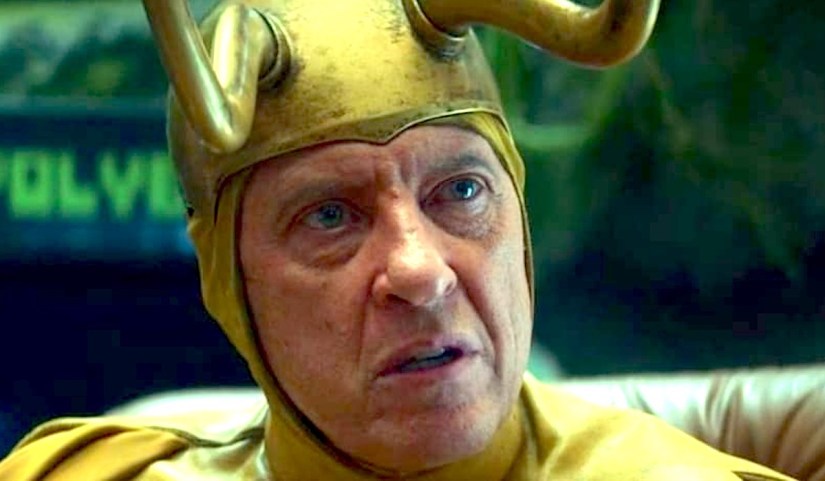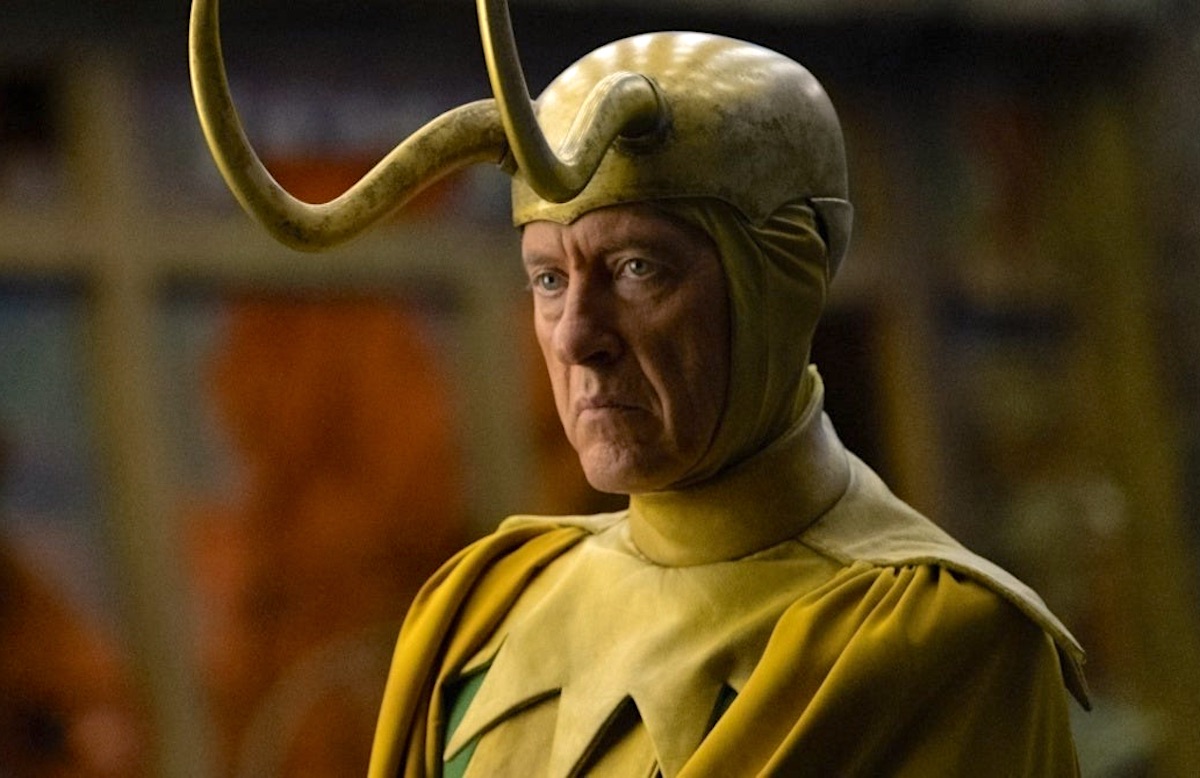***Spoilers for Loki episode 5***
Amongst the delights to be had with the multiple Lokis of Loki episode 5, “Journey Into Mystery,” Richard E. Grant delivers a standout performance as “Classic Loki.” Dressed in a perfect replica costume of Jack Kirby’s ’60s-era comics Loki, the Loki played by Grant is older, wiser, and has seen some things in his time. He’s also an accomplished sorcerer who fully mastered the power of illusion. As he explains, he used this ability in order to change the fate that awaited Loki at Thanos’s hands in Avengers: Infinity War. Classic Loki sent a double in his place so convincing that even Thanos was fooled.
In having Grant’s Loki tell this story, the Loki show mocks one of the most ridiculous and incongruous parts of the blockbuster Marvel movie. It also makes canon—in a way—some popular fan theories about how that infamous death scene could have played out. Lest we doubt that the series is poking fun directly at Loki’s death scene, a reminder that when Grant’s Classic Loki is told that “blades look awesome,” he replies, droll, “Especially when they clatter to the ground just before your neck is snapped.”
Though it comes far too soon in the film, in some ways Loki gets a great final scene in Infinity War. He shows how much he cares for his family by sacrificing himself for Thor and to buy time for the Asgardian refugees. He acknowledges the dual heritage that had long plagued him, naming himself both the rightful king of Jotunheim, prince of Asgard, and an Odinson. It’s his character arc from 2011’s Thor to 2017’s Ragnarok come full circle.

But fans have taken issue with what happens next. Loki—a trickster God, highly-trained warrior, and skillful magic-user—tries to go at Thanos with a small blade in hand. Thanos easily dispatches this and then brutally snaps his neck. It’s gruesome, and all the more upsetting due to the fact that Loki doesn’t use any of the many powers at his disposal when he approaches Thanos. The list of Loki’s considerable abilities, from summoning “concussive energy blasts” to illusions, shapeshifting, telekinesis, and “genius intelligence,” runs many paragraphs on Marvel.com.
As I wrote back in 2018:
Many Loki-watchers felt like his abrupt move to stab the Mad Titan was extremely out-of-character: Loki is the only one on board The Statesman spaceship who knows who Thanos is and what he is capable of, yet he tries to attack a hugely powerful being who already wields some Infinity Stones with a tiny knife?
For a genius-level god and powerful sorcerer, it’s a pretty silly move.
This tactic has annoyed Loki fans for a long time. There was even a popular theory pre-Endgame that he was still alive and had in fact sent a double in his place. Evidence to support this included the observation that he used a left-handed grip on the knife with Thanos, whereas he had almost always held weapons in his right hand. The theory suggested that the left-handed grip showed he was actually a “mirrored” illusion Loki and not the real God of Mischief.
In 2018, I also agreed the illusion theory was a good idea, writing, “A much better plan, which explains this apparent folly, would be if Loki had sent a double in his place to give said dramatic speech and ‘die’ in order to give the real Loki the chance to escape. He could have … used his arts to somehow survive in space. Thor did okay just kind of floating around until the Guardians found him, so it’s not inconceivable.”
Grant’s Loki confirms that this is exactly the sort of trick that Loki would have pulled, because that’s what he did. He sent a Loki projection up against Thanos, and then he says he drifted around in space like so much debris for a while.
Here’s the scene as it played out in Loki’s episode “Journey into Mystery”:
Classic Loki: In my timeline, everything proceeded correctly, my entire life, until Thanos attacked our ship.
[So you didn’t try to stab him?]
Classic Loki: Certainly not. Take no offense, my friends, but blades are worthless in the face of a Loki sorcery. They stunt our magical potential.
[But they look awesome.]
Classic Loki: Oh, yes. Especially when they clatter to the ground just before your neck is snapped. I cast a projection of myself so real, even the Mad Titan believed it. Then hid as inanimate debris. After I faked my death, I simply drifted in space. Away from Thor, away from everything.

Whether Loki’s writers were aware of fan theories about the Loki double or not, it’s a natural story to arrive on—because it’s just so much more of a crafty Loki action to take than bringing a knife to an Infinity Stone party.
While the Loki series has demonstrated that Loki’s plans are not always so well-thought-out as he would have us believe, at the Infinity War juncture in the MCU, Loki was known for being a devious and cunning tactician. And yet. So by giving Grant’s Loki this alternate timeline story, Loki fans are satisfied in their Infinity War complaints and assured it might’ve happened differently. It’s a perfect moment.
Considering that Loki’s death was supposed to be permanent at the time that Infinity War was written and filmed, he deserved a better way to go. Thankfully, Loki gives us a new and gradually evolving Loki, alongside many other Lokis that he encounters on his journey. I adore Sylvie and Alligator Loki is an icon, but Richard E. Grant’s dramatic, thoughtful, lonely, wise Loki might be my favorite to date. And he acted just as a Loki should.
(images: Marvel Studios)
Want more stories like this? Become a subscriber and support the site!
—The Mary Sue has a strict comment policy that forbids, but is not limited to, personal insults toward anyone, hate speech, and trolling.—










Published: Jul 9, 2021 09:00 am